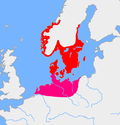are reconstructable for Proto-Slavic have been identified as borrowings from the languages of various tribes that Proto-Slavic speakers interacted with...
22 KB (2,403 words) - 18:39, 1 November 2024
Proto-Slavic (abbreviated PSl., PS.; also called Common Slavic or Common Slavonic) is the unattested, reconstructed proto-language of all Slavic languages...
76 KB (7,628 words) - 19:42, 22 October 2024
Proto-Balto-Slavic (PBS or PBSl) is a reconstructed hypothetical proto-language descending from Proto-Indo-European (PIE). From Proto-Balto-Slavic, the...
100 KB (11,146 words) - 22:19, 9 November 2024
development and origin. A Proto-Balto-Slavic language is reconstructable by the comparative method, descending from Proto-Indo-European by means of well-defined...
62 KB (7,279 words) - 22:32, 3 November 2024
The Proto-Slavic language, the hypothetical ancestor of the modern-day Slavic languages, developed from the ancestral Proto-Balto-Slavic language (c. 1500 BC)...
75 KB (9,358 words) - 09:47, 6 October 2024
Slavs (redirect from SlavicPeoples)
Slověne (Словѣне). Those forms point back to a Slavic autonym, which can be reconstructed in Proto-Slavic as *Slověninъ, plural Slověne.[citation needed]...
106 KB (9,266 words) - 05:51, 11 November 2024
from a proto-language called Proto-Slavic, spoken during the Early Middle Ages, which in turn is thought to have descended from the earlier Proto-Balto-Slavic...
77 KB (7,575 words) - 09:49, 12 November 2024
diphthongs is a Proto-Slavic sound change in which diphthongs turn into vowels. It is one of the key events in the chronology of the Proto-Slavic language....
3 KB (436 words) - 20:11, 16 September 2024
West Slavic languages History of the Slavic languages, Proto-Balto-Slavic language, Proto-Slavic language, History of Proto-Slavic, Proto-Slavic borrowings...
9 KB (850 words) - 01:47, 12 July 2024
The history of the Slavic languages stretches over 3000 years, from the point at which the ancestral Proto-Balto-Slavic language broke up (c. 1500 BC)...
61 KB (7,549 words) - 23:53, 22 September 2024
or its two dialects, Proto-Gheg and Proto-Tosk, experienced the earliest contacts with South Slavic languages since the Slavic migrations to the Balkans...
127 KB (11,428 words) - 20:35, 21 November 2024
The Slavic second palatalization is a Proto-Slavic sound change that manifested as a regressive palatalization of inherited Balto-Slavic velar consonants...
9 KB (859 words) - 03:17, 16 November 2024
languages, Slavic lexical borrowings represent at least 15% of the total vocabulary. However, Albanian has much lower influence from Slavic than Romanian...
11 KB (1,088 words) - 10:03, 28 June 2024
phonology, also proposed Semitic borrowings into Proto-Indo-European, suggesting a more southern homeland to explain these borrowings. According to Mallory and...
119 KB (14,055 words) - 04:49, 20 November 2024
The Slavic first palatalization is a Proto-Slavic sound change that manifested as regressive palatalization of inherited Balto-Slavic velar consonants...
8 KB (1,014 words) - 03:16, 16 November 2024
vocalization) occurred in parallel in the East Slavic languages. The change acted on syllables in which the Proto-Slavic liquid consonants *r and *l occurred in...
13 KB (1,473 words) - 03:17, 16 November 2024
East Slavic language at any time in the past. According to them, the dialects of East Slavic tribes evolved gradually from the common Proto-Slavic language...
55 KB (4,965 words) - 18:10, 7 November 2024
often integrating them with non-Slavic sources such as Hinduism (because they are believed to come from the same Proto-Indo-European source). Rodnover...
257 KB (30,164 words) - 11:14, 4 November 2024
Derksen proposed that Proto-Balto-Slavic split into three language groups — East Baltic, West Baltic and Proto-Slavic — without a Proto-Baltic stage, which...
100 KB (6,679 words) - 12:16, 22 October 2024
into contact with early Slavic cultures, as reflected in early Germanic loans in Proto-Slavic. By the third century, Late Proto-Germanic speakers had expanded...
130 KB (12,136 words) - 03:56, 16 November 2024
The lexis of Bulgarian, a South Slavic language, consists of native words, as well as borrowings from Russian, French, and to a lesser extent English,...
11 KB (1,042 words) - 13:37, 4 July 2024
more precisely to the north of the Jiriček Line Proto-Slavic—the root from which the modern Slavic languages developed—emerged during the first half...
33 KB (3,936 words) - 12:50, 26 October 2024
have survived with relatively little change as borrowings in Finnic languages. Some of these may be of Proto-Germanic origin or older still, but others reflect...
22 KB (2,272 words) - 18:29, 31 October 2024
direct borrowings in each of these languages or internally Slavic mediation of borrowings. Other words of Romanian origin common among Slavic languages...
12 KB (1,159 words) - 11:31, 27 June 2024
Bulgarian language (redirect from Bulgarian Slavic language)
lack of a verb infinitive. They retain and have further developed the Proto-Slavic verb system (albeit analytically). One such major development is the...
114 KB (12,997 words) - 19:30, 9 November 2024
and female can be romantically involved with humans. The Slavic terms descend from Proto-Slavic *zmьjь. The further derivation that Serbo-Croatian zmaj...
49 KB (5,001 words) - 04:49, 19 November 2024
Proto-Indo-Iranian, also called Proto-Indo-Iranic or Proto-Aryan, is the reconstructed proto-language of the Indo-Iranian branch of Indo-European. Its...
38 KB (1,587 words) - 20:02, 16 November 2024
Proto-Indo-European society is the reconstructed culture of Proto-Indo-Europeans, the ancient speakers of the Proto-Indo-European language, ancestor of...
78 KB (9,373 words) - 07:05, 21 October 2024
Ef has a value of 500. The Slavic languages have almost no native words containing /f/. This sound did not exist in Proto-Indo-European (PIE). It arose...
5 KB (449 words) - 16:05, 21 November 2024
History of the Russian language (category Articles containing Proto-Slavic-language text)
East Slavic language of the Indo-European family. All Indo-European languages are descendants of a single prehistoric language, reconstructed as Proto-Indo-European...
65 KB (6,532 words) - 16:16, 9 September 2024








